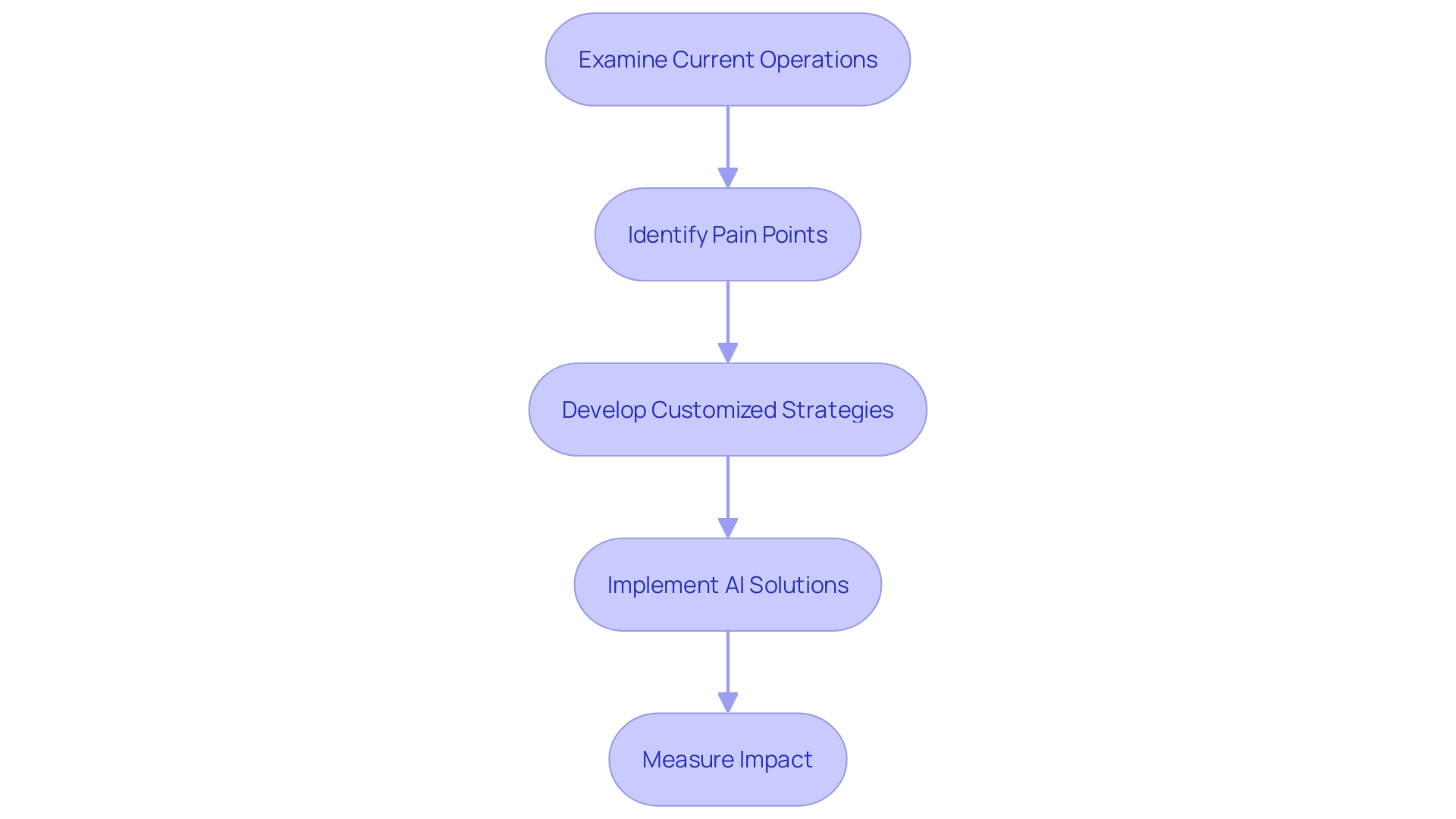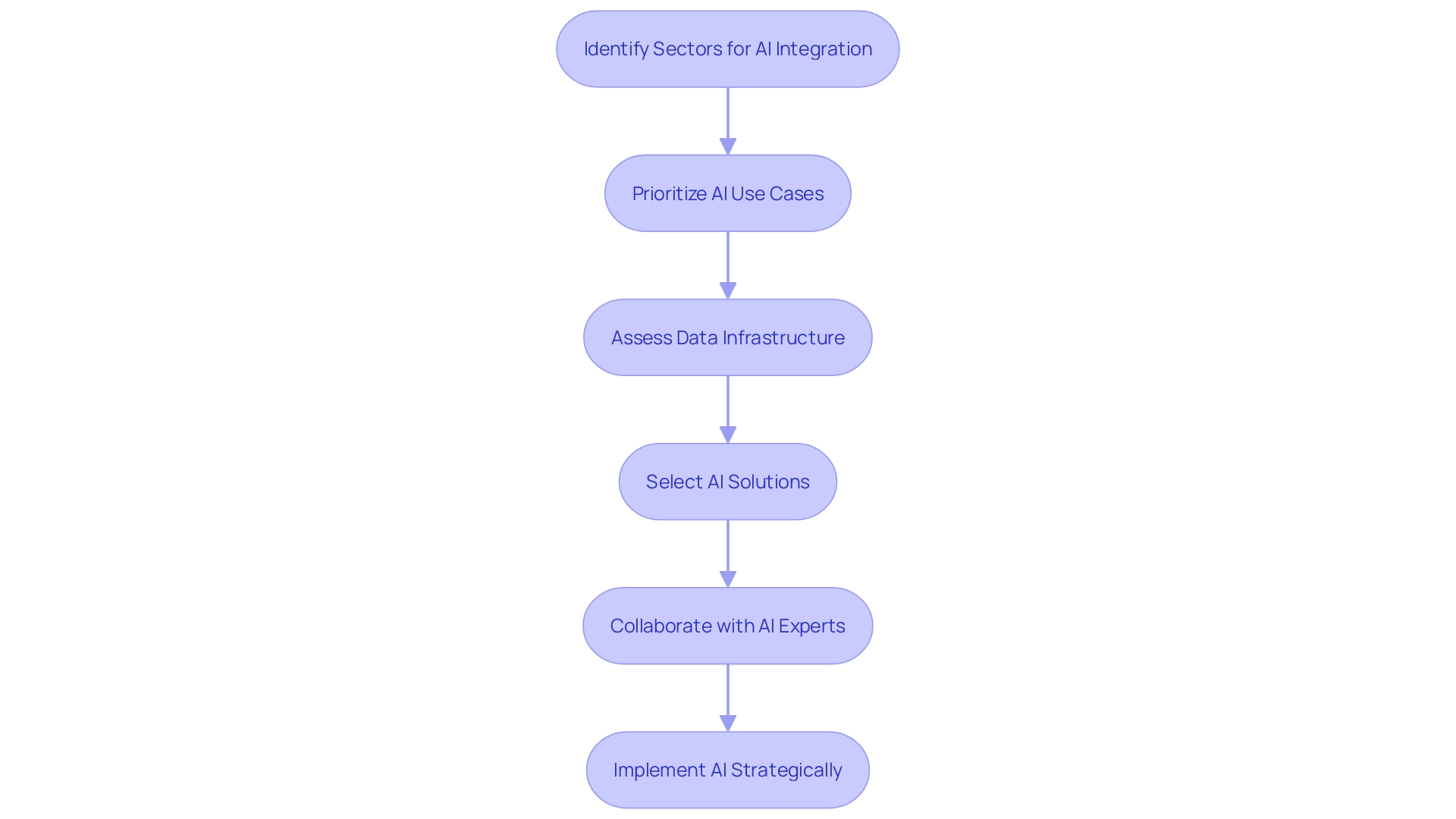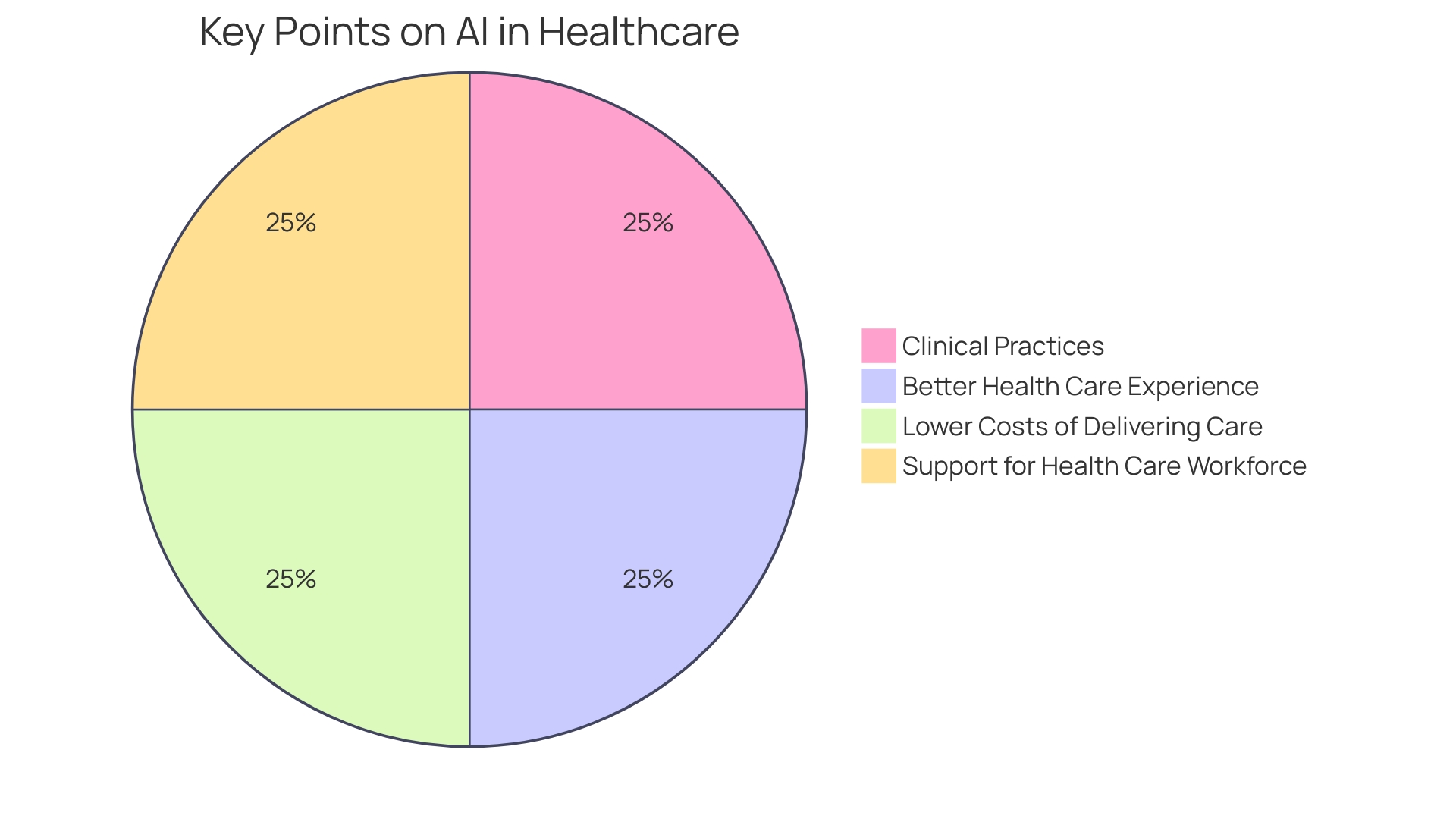Introduction
AI consulting services are playing a crucial role in today’s rapidly evolving business landscape, where companies must adapt to stay competitive. From optimizing marketing across multiple languages to enhancing guest satisfaction through automated communication channels, businesses are turning to AI consultants to address their unique challenges. These consultants meticulously analyze existing operations, identifying pain points and opportunities where AI can make the most impact.
By developing customized strategies and fostering an engineering culture of innovation, AI consultants empower organizations to leverage AI for operational efficiency and growth. The goal is to position AI as a cornerstone of a company’s excellence and customer satisfaction. In this article, we will explore the role of AI consultants, the importance of designing an AI strategy, the implementation of AI solutions, successful case studies, overcoming challenges, and future trends in AI consulting.
Understanding the Business Landscape
AI consulting services play a pivotal role in the modern commercial environment, where companies must adapt to rapidly evolving technologies to stay competitive. A prime example of this is the integration of AI into various operational sectors. For instance, at Holiday Extras, a European travel extras provider, the challenge was to manage marketing across multiple languages and ensure data literacy among non-technical employees. Similarly, Leonardo Hotels needed to enhance guest satisfaction by optimizing communication channels and automating responses to frequently asked questions.
To tackle these operational challenges, AI consultants start by carefully examining the organization’s current operations and identifying areas suitable for AI intervention. This deep dive into the company’s processes is critical for uncovering specific pain points and opportunities where AI can deliver the most impact. For instance, generative AI, which has made significant progress in public awareness in the past few years, has the potential to transform how companies like Holiday Extras and Leonardo Hotels engage with customers and handle internal operations.
The roadmap to AI success involves developing customized strategies that resonate with the company’s unique challenges and objectives. In 2023 alone, the landscape witnessed a surge in AI adoption across multiple functions, such as document processing and customer self-service, highlighting the trend towards automation. Moreover, Ipsos’s research indicates the significance of building a robust AI roadmap based on evidence-based best practices, which is essential for realizing value from AI investments.
The journey towards AI transformation is not just about technology implementation; it’s about building an engineering culture that fosters innovation and creates a competitive advantage. CEOs are increasingly recognizing the significance of using software to establish new avenues that go beyond mere commodities. As such, AI consulting services must empower organizations to leverage AI in ways that truly enhance operational efficiency and drive growth, as underscored by the AI and automation action guide with its 11-point blueprint for optimizing intelligent automation.
In summary, the role of AI consultants is to guarantee that AI initiatives are not only in line with the organization’s vision but also establish the organization as a dominant force in markets effectively. By doing so, AI can transcend being a buzzword and become a cornerstone of an organization’s operational excellence and customer satisfaction.

Designing an AI Strategy
To leverage the transformative power of Artificial Intelligence (AI), it is crucial for organizations to build a strategic roadmap tailored to their distinct objectives. AI consultants play an integral role in this endeavor, meticulously aligning AI initiatives with a company’s vision to unlock maximum potential. This procedure starts with a specific identification of sectors within the organization that have the potential to benefit greatly from AI integration. Subsequently, the prioritization of AI use cases is methodically based on their projected impact, ensuring that the most significant areas are addressed first.
In the pursuit of AI excellence, it’s not just about having cutting-edge technology; it’s about having the right technology that speaks to the specific needs of the business. As indicated by recent industry surveys, the primary determinant for AI success is a well-defined strategy that’s informed by a comprehensive understanding of the information availableâencompassing everything from internal communications to customer interactions.
Furthermore, having a transparent set of objectives and key milestones paves the way for measurable progress and quantifiable achievements in the AI journey. It’s about feeding the ‘AI beast’ the appropriate information and knowing how to harness it effectively. This requires a critical assessment and, if necessary, an enhancement of the existing data infrastructure to ensure it’s ready for the sophisticated demands of machine learning and deep learning models.
As we stand at the crossroads of technological innovation, it’s also essential to recognize the distinction between general-purpose AI models and specialized AI models. While the former offers versatility, the latter provides in-depth insights within specific domains, allowing organizations to maintain tighter control and bolster security. This differentiation underscores the importance of selecting AI solutions that not only advance current operational capabilities but are also scalable and flexible enough to evolve with the company’s growth.
By working together with AI experts who have a thorough grasp of industry-specific obstacles and a dedication to creativity, enterprises can confidently navigate the AI terrain. Such a collaboration guarantees the smooth incorporation of AI into the fabric of the organization, revolutionizing operations and fostering unparalleled efficiency and productivity.

Implementing AI Solutions
AI advisors act as guides for enterprises exploring the domain of artificial intelligence, directing them through the intricacies of adoption and integration. This journey starts with a comprehensive analysis of the organization’s current operations, market conditions, and existing technological infrastructure, as outlined in our in-depth assessments. During this procedure, AI experts recognize strategic chances where AI can enhance growth and effectiveness, particularly in domains like automating customer interactions or streamlining order processing systems.
After identifying the strategic areas, the role of the specialist transforms into developing a customized AI strategy that is in line with the organization’s long-term goals. The strategy encompasses a detailed roadmap, complete with key milestones, resource planning, and performance indicators, ensuring that the AI initiatives are not only successfully launched but also sustainable in driving business value.
The hands-on support from AI experts is crucial during the implementation phase, where they assist in selecting the suitable AI tools and technologies customized to the company’s needs. They provide guidance in sourcing relevant data sets and constructing robust AI models that yield precise and actionable insights. A case in point is the integration of AI in a restaurant’s drive-through service, which showcases how voice assistants can enhance operational efficiency and customer satisfaction.
Moreover, AI advisors play a crucial part in promoting an AI-focused culture within the organization. They facilitate the transition to AI-powered processes by offering training and ongoing support to employees, helping them adapt to new workflows and embrace the technological shift.
Through vigilant monitoring and optimization of AI systems, AI consultants ensure that organizations not only embrace AI but also harness its full potential to achieve tangible results. Their expertise is instrumental in transforming traditional business processes and catalyzing an era of smarter, AI-driven operations.

Case Studies: Successful AI Transformations
Exploring the transformative power of AI in healthcare, we delve into an innovative algorithm designed to predict patient deterioration. This AI model continuously monitors a plethora of information points, including vital signs and lab results, to calculate a risk score indicating the likelihood of a patient’s health decline. The system operates discreetly in the background, issuing alerts to the care team if a potential issue arises. This predictive capacity has profound implications, fostering stronger communication channels and contributing to a more resilient healthcare system in high-pressure scenarios.
One such success story involves a multidisciplinary team including Lisa Shieh, MD, PhD, clinical professor of medicine; Margaret Smith, director of operations for primary care and population health; and Jerri Westphal, nursing informatics manager, who led the deployment of this AI system. Their efforts underscore the critical role AI plays in enhancing patient care and safety.
In the broader industry context, companies like Rejoy Health and Anterior are making strides with AI-driven healthcare solutions. Rejoy Health’s use of proprietary large language models (LLMs) exemplifies how AI can streamline medical information processing, saving healthcare professionals up to 14 hours per month in information searches. Anterior stands out for integrating clinicians into its AI development teams, addressing staffing shortages and reducing administrative burdens.
Furthermore, the emergence of platforms employing large language models to assist with health insurance appeals demonstrates Ai’s potential to demystify complex processes, empowering patients to advocate for their rights.
The integration of AI technologies, including big information and machine learning, is revolutionizing digital health, signaling a shift towards a more efficient, intuitive, and resilient healthcare system. As evidenced by an 88 percent potential impact recognition among health system executives, AI remains a critical investment priority, despite a current investment gap. The ongoing research and development in this field continue to pave the way for improved healthcare services, as the industry strives to meet the evolving needs of clinicians, patients, and their families.

Overcoming Challenges
Navigating the complexities of AI implementation can be daunting, but experts in AI have developed a toolkit of strategies to address these challenges head-on. Issues such as ensuring information accuracy and availability are common roadblocks. AI experts frequently employ data augmentation methods and synthetic data generation to enhance datasets where information might be scarce due to collection costs or rarity of events. Ethical considerations also play a critical role, as AI applications should be developed with a keen awareness of their potential societal impact.
A case in point is the innovative use of AI by an elite athlete with a vision impairment, where technology not only aids in personal navigation but also expands possibilities for competitive sports. This underscores the importance of incorporating AI ethics and user-centric design from the outset. Furthermore, the exponential expansion of AI research, with publications in the domain increasing twofold about every 23 months, emphasizes the necessity for AI experts to uphold a comprehensive understanding and forecast forthcoming patterns, as demonstrated by tools like Science4Cast.
Resistance to change is another significant hurdle, but by drawing on successful case studies, such as health systems that have reduced inpatient mortality through innovation competitions, AI experts can demonstrate tangible benefits and foster a culture of acceptance. They provide insights into Ai’s diverse applications, from advancing scientific research to optimizing organizational operations, and guide organizations in embracing AI not as a threat, but as a catalyst for innovation and efficiency. By utilizing their expertise, AI consultants help organizations overcome these challenges and effectively utilize the power of AI.
Future Trends in AI Consulting
AI consulting services are increasingly vital, especially as AI technology matures and integrates seamlessly with other disruptive technologies like blockchain and IoT. Notably, the emergence of generative AI models, such as OpenAI’s ChatGPT, marks a significant shift in the industry. These models have the extraordinary ability to produce new, intelligent content and analyze vast datasets efficiently, thereby transforming how consulting services are delivered. For instance, Leonardo Hotels leveraged AI to enhance guest experiences and streamline communications, showing the potential of AI to drive operational excellence in the hospitality sector. Similarly, businesses can utilize AI consulting to address complex issues, ranging from predictive maintenance to fraud detection, and to develop ethical, privacy-conscious AI strategies. With the Asia-Pacific region rapidly adopting AI, fueled by industrial growth and supportive policies, and as digital transformation becomes a necessity post-pandemic, staying informed about AI trends is crucial for maintaining a competitive edge and embracing innovation.
Conclusion
AI consulting services are essential for businesses in today’s rapidly evolving landscape. These services enable companies to leverage AI for operational efficiency and growth. By analyzing current operations, AI consultants identify pain points and opportunities where AI can make the most impact.
They develop customized strategies and foster an innovative engineering culture to position AI as a cornerstone of excellence and customer satisfaction.
Designing an AI strategy is crucial for businesses to harness the transformative power of AI. AI consultants align AI initiatives with the company’s vision and prioritize use cases based on their projected impact. A clearly defined strategy, informed by a robust understanding of data, is essential for AI success.
Transparent objectives and key milestones ensure measurable progress.
Implementing AI solutions requires the guidance of AI consultants who navigate the complexities of artificial intelligence. They analyze current operations, market conditions, and technological infrastructure to identify strategic opportunities for AI integration. AI consultants craft bespoke strategies and assist in choosing the appropriate AI tools and technologies.
They also foster an AI-centric culture within the organization.
Successful case studies highlight the transformative power of AI in various industries. AI algorithms predict patient deterioration in healthcare, contributing to a more resilient healthcare system. Companies like Rejoy Health and Anterior streamline processes and integrate clinicians into AI development teams.
AI consultants overcome challenges in AI implementation by addressing data quality and availability through techniques like data augmentation. Ethical considerations are crucial, and AI applications should be developed with awareness of their societal impact. Demonstrating tangible benefits and drawing on successful case studies helps overcome resistance to change.
Future trends in AI consulting are driven by the maturing AI technology and its integration with disruptive technologies like blockchain and IoT. Generative AI models transform how consulting services are delivered. AI consulting services remain vital as the Asia-Pacific region adopts AI rapidly and digital transformation becomes a necessity.
In conclusion, AI consulting services empower businesses to leverage AI for operational efficiency and growth. Partnering with AI consultants positions AI as a cornerstone of excellence and customer satisfaction.

